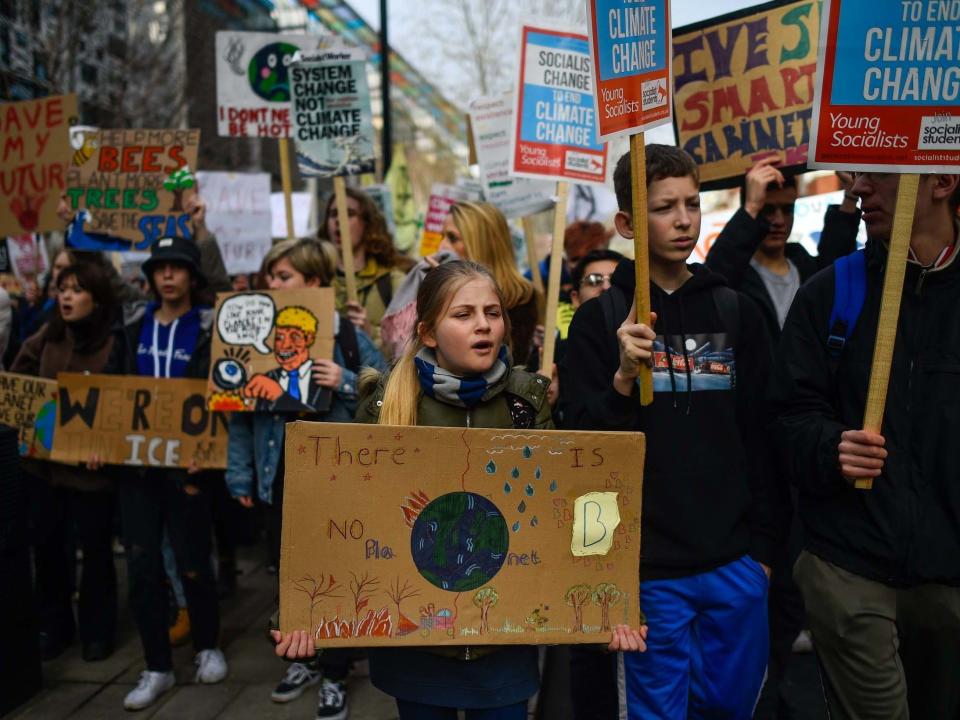Every country on Earth failing to provide world fit for children, landmark report warns

Every country in the world is failing to protect children’s health, their environment and their futures, a landmark report for the World Health Organisation has found.
The damning findings pull back the curtain on an increasingly fragile world in which unbridled industrialism is already sabotaging the lives of younger generations.
The report, based on a commission of more than 40 child and adolescent health experts from around the world, said every child on Earth is now “under immediate threat from ecological degradation, climate change and exploitative marketing practices that push heavily processed fast food, sugary drinks, alcohol and tobacco at children”.
“Despite improvements in child and adolescent health over the past 20 years, progress has stalled, and is set to reverse,” said Helen Clark, the former prime minister of New Zealand and co-chair of the commission.
The report, by the WHO, the United Nations Children’s Fund (Unicef) and the Lancet Commission, ranked 180 countries on the conditions they provide for a child to “thrive and survive”.
The UK scraped into the top 10 countries for overall health and wellbeing of children, behind Norway, which took the number one spot, South Korea, the Netherlands and France.
The UK was just ahead of Sweden, Germany and Switzerland. Despite its wealth, the US performed badly in the rankings, listed as only the 39th best place for children
The report said while wealthier countries generally have better child health and development outcomes it is them in particular who “threaten the future of all children through carbon pollution, on course to cause runaway climate change and environmental disaster”.
When authors took per capita CO2 emissions into account, the rankings told a very different story. Norway ranked 156th, the Republic of Korea 166 and the Netherlands 160. Each of these countries emits 210 per cent more CO2 per capita than their 2030 target. The UK ranked 136th on this measure.
The US, Australia and Saudi Arabia are among the 10 worst emitters.
“It has been estimated that around 250 million children under five years old in low- and middle-income countries are at risk of not reaching their developmental potential, based on proxy measures of stunting and poverty. But of even greater concern, every child worldwide now faces existential threats from climate change and commercial pressures,” Ms Clark said.
The authors of the report said: “Governments must harness coalitions across sectors to overcome ecological and commercial pressures to ensure children receive their rights and entitlements now and a liveable planet in the years to come.”
The growing levels of marketing companies are directing at young people are of particular concern.
Evidence suggests that children in some countries see as many as 30,000 advertisements on television alone in a single year, the report warns.
Exposure to the “predatory marketing” of unhealthy junk food and sugary drinks is directly linked to the purchase of unhealthy food and drinks, which have fuelled health problems including the “alarming rise in childhood obesity”, the authors said.
The number of obese children and adolescents around the world increased from 11 million in 1975 to 124 million in 2016 – an 11-fold increase, with dire individual and societal costs.
Dr Tedros Adhanom Ghebreyesus, the director-general of the WHO, described the report as a “wakeup call”.
He said: “This report shows that the world’s decision-makers are, too often, failing today’s children and youth: failing to protect their health, failing to protect their rights, and failing to protect their planet.
“This must be a wakeup call for countries to invest in child health and development, ensure their voices are heard, protect their rights, and build a future that is fit for children.”
To protect children, the independent commission authors call for a new global movement driven by and for children. Specific recommendations include:
Stop CO2 emissions with the utmost urgency, to ensure children have a future on this planet;
Place children and adolescents at the centre of our efforts to achieve sustainable development;
New policies and investment in all sectors to work towards child health and rights;
Incorporate children’s voices into policy decisions;
Tighten national regulation of harmful commercial marketing, supported by a new Optional Protocol to the UN Convention on the Rights of the Child.
Dr Richard Horton, the editor-in-chief of The Lancet family of journals, said: “The opportunity is great. The evidence is available. The tools are at hand. From heads-of-state to local government, from UN leaders to children themselves, this commission calls for the birth of a new era for child and adolescent health. It will take courage and commitment to deliver. It is the supreme test of our generation.”
Henrietta Fore, Unicef’s executive director, said: “From the climate crisis to obesity and harmful commercial marketing, children around the world are having to contend with threats that were unimaginable just a few generations ago.
“It is time for a rethink on child health, one which places children at the top of every government’s development agenda and puts their wellbeing above all considerations.”

